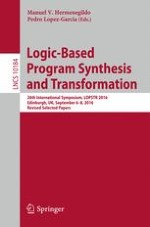This book constitutes the thoroughly refereed post-conference proceedings of the 26th International Symposium on Logic-Based Program Synthesis and Transformation, LOPSTR 2016, held in Edinburgh, UK, in September 2016.
The 20 revised full papers presented together with the abstracts of 3 invited talks were carefully reviewed and selected from 38 submissions. The aim of the LOPSTR series is to stimulate and promote international research and collaboration on logic-based program development. LOPSTR is open to contributions in all aspects of logic-based program development, all stages of the software life cycle, and issues of both programming-in-the-small and programming-in-the-large. LOPSTR traditionally solicits contributions, in any language paradigm, in the areas of synthesis, specification, transformation, analysis and verification, specialization, testing and certification, composition, program/model manipulation, optimization, transformational techniques in SE, inversion, applications, and tools.
